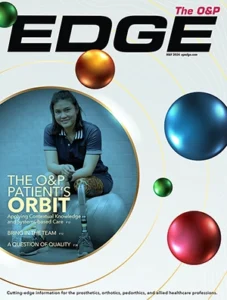If you follow the Winter Paralympic Games, keep an eye out for 36-year-old Sophie from Perpignan, which is in the south of France on the Spanish border. A year after her above-knee amputation, 36-year-old Sophie became more open to trying new things that were outside her comfort zone—including parasports. “I’ll be taking part in the 2026 Paralympic Winter Games in snowboardcross,” says Sophie.
What caused the change? Sophie credits much of her increased confidence and abilities to SYNSYS, the full-leg microprocessor system that she has been using for the last three and a half years. Until recently, SYNSYS has only been available in Europe, but has just launched in the US by PROTEOR in March.
Living Without Fear
“We often talk about ‘resilience’ in the world of disability. It’s a psychological state that enables people to rebuild their lives after hardships,” says Sophie. “I’ve realized today that it’s not just a question of psychological work on the part of the patient. It can also be achieved thanks to a series of factors and events that enable the person to have confidence in their abilities.”
Gaining greater flexibility and agility—such as being able to squat naturally and walk downstairs without fear of falling with SYNSYS—was a huge factor that has made both physical and psychological improvements in Sophie’s life. “Increasing your abilities and trusting them helps you to regain your self-confidence and cultivate a positive self-image,” says Sophie.
“A big advantage of going downstairs [with SYNSYS] is that you no longer have to put half your foot on the step to get the prosthesis to plantarflex,” says Sophie. SYNSYS is the only microprocessor full-leg system that provides triple hip-knee-ankle flexion and the widest ankle range of motion (42°) available. “You can place your foot wherever you want on the step and the triple flexion creates a vertical descent movement rather than a forward tilt,” explains Sophie. “Physiologically there are fewer compensatory movements. I can live in the present moment without fear or dread.”
Life-Changing Experience
Participating in the European trial of SYNSYS gave Sophie so much more than she ever expected. “I was hoping for a better prosthesis than the one I had before, but I didn’t expect it to change my whole life,” explains Sophie. “It just goes to show that we’ll never be able to measure the extent of the help provided by new technologies.”
Being able to easily slip the foot under a chair—and preset up to ten different heel heights—allows Sophie to wear a wide range of fashionable shoes, including open-toed, high-heeled sandals. She can even walk barefoot. Being able to stay on the go for up to ten to 15 days—without having to recharge the battery—is another convenience that is ideal for Sophie’s busy life.
Just as importantly, SYNSYS looks, feels, and moves more like a natural leg, ankle, and foot than a prosthesis. “A lot of work has been done on the aesthetics of the SYNSYS prosthesis so that the ankle looks good, as do the shape of the prosthesis and the covers,” says Sophie. “It makes it easier to accept your prosthesis.”
It’s Not Always Easy
Sophie’s journey hasn’t been without challenges. She says she went back to work too quickly following her amputation. Things didn’t work out because her French employer didn’t offer any accommodations. “People see us standing up and think everything’s fine. But it’s impossible for a transfemoral amputee to have the same days as before with no rest.” She is now undergoing training to find a new occupation.
Sophie’s marriage also ended because her husband couldn’t accept her amputation. Today, she shares her life with an ortho-prosthetist who is learning a great deal from her. “He didn’t realize how difficult everyday life is for an amputee,” explains Sophie. “But he accepts it very well and helps me a lot.” They enjoy wakeboarding and snowboarding together.
Supporting Others
Every day, Sophie tries to get outside and engage in some type of physical activity to help her mind and to challenge her body. She encourages others to do the same and supports national and local associations that help amputees with financial hardships get fitted with a prosthesis through donations, sponsorships, and special events. “Sliding sports with both feet attached are very good for transfemoral amputees who can do them because it helps them build muscles to stay on their feet,” explains Sophie.
Sophie’s life has changed so much for the better with SYNSYS that she has become a brand ambassador for PROTEOR. “I didn’t imagine my life afterwards. What is totally unpredictable, unheard of, [and] unthinkable becomes completely possible,” she says. “Since I’ve been living with [SYNSYS], I’ve undertaken even more things than when I was an able-bodied woman.”




